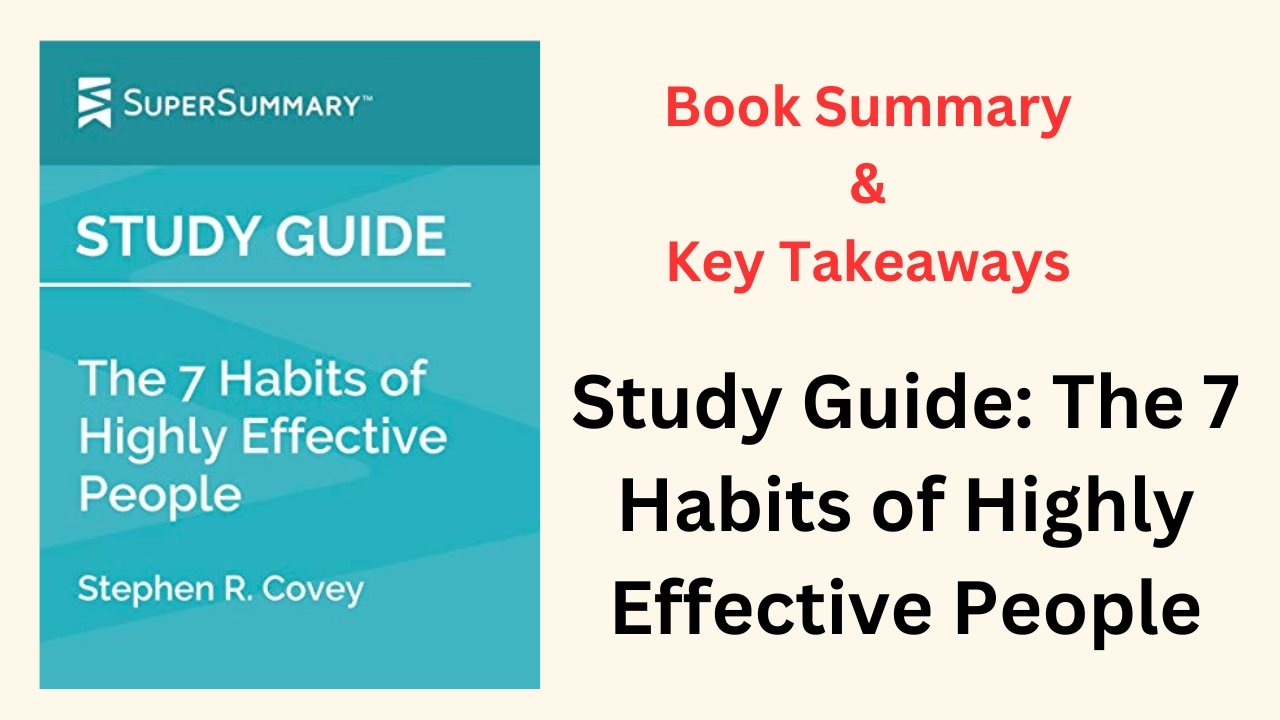Book Summary
Book Summary – Study Guide: The 7 Habits of Highly Effective People

In the book “Study Guide: The 7 Habits of Highly Effective People” by Stephen R. Covey, the author presents a holistic approach to personal and professional effectiveness based on timeless principles. This study guide aims to summarize the key takeaways from the book, providing a clear overview of its main ideas and insights.
Habit 1: Be Proactive
Key takeaway: Proactivity is the foundation of personal effectiveness.
- Being proactive means taking responsibility for our actions, choices, and lives.
- Proactive individuals focus on what they can control and do not let external circumstances dictate their behavior.
- By adopting a proactive mindset, we can better respond to challenges and find creative solutions.
Habit 2: Begin with the End in Mind
Key takeaway: Having a clear vision and purpose helps guide our actions towards meaningful goals.
- Defining our personal mission statement allows us to align our actions with our values and long-term aspirations.
- Having a clear understanding of what we want to achieve helps us prioritize tasks and make better decisions.
- Visualizing the desired outcomes helps us stay focused and motivated.
Habit 3: Put First Things First
Key takeaway: Effective time management enables us to prioritize important tasks and maintain a healthy work-life balance.
- We should prioritize tasks based on their importance and urgency, focusing on activities that align with our goals.
- Effective time management requires discipline and the ability to say no to non-essential tasks.
- By organizing our time around our priorities, we can achieve a sense of fulfillment and reduce stress.
Habit 4: Think Win-Win
Key takeaway: Adopting a win-win mindset fosters collaboration, builds trust, and creates mutually beneficial relationships.
- Seeking mutually beneficial solutions helps build strong interpersonal relationships.
- A win-win approach encourages cooperation and collective problem-solving.
- Win-win thinkers find creative solutions that consider the needs and interests of all parties involved.
Habit 5: Seek First to Understand, Then to be Understood
Key takeaway: Effective communication requires active listening and empathy.
- We should seek to understand others before sharing our own perspectives and opinions.
- Active listening involves giving our full attention, asking clarifying questions, and validating others’ feelings.
- By understanding others’ viewpoints, we can find common ground and build stronger relationships.
Habit 6: Synergize
Key takeaway: Synergy arises when individuals collaborate and leverage their unique strengths to achieve greater results.
- Synergy involves valuing and celebrating individual differences and leveraging them to create something greater than the sum of its parts.
- Collaboration and teamwork are essential for achieving synergy.
- Synergy fosters innovation, creativity, and collective problem-solving.
Habit 7: Sharpen the Saw
Key takeaway: Personal renewal is crucial for maintaining balance and long-term effectiveness.
- Sharpening the saw involves taking care of our physical, mental, emotional, and spiritual well-being.
- We should consistently engage in activities that contribute to our personal growth and renewal.
- Taking time to recharge and reflect allows us to better navigate the challenges and demands of life.
Overall, “The 7 Habits of Highly Effective People” by Stephen R. Covey offers a comprehensive framework for personal and professional growth. By embracing these seven habits, individuals can enhance their effectiveness, build strong relationships, and lead more fulfilling lives.
